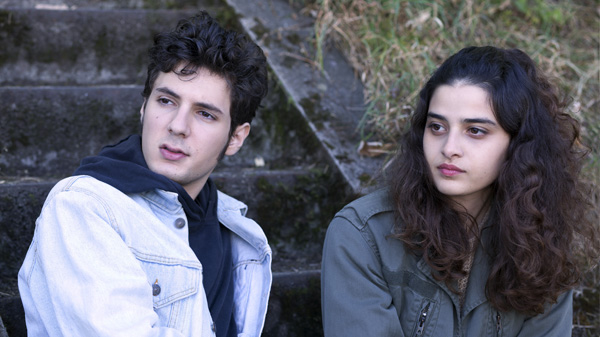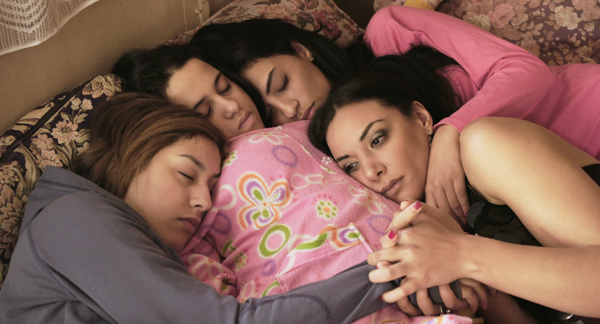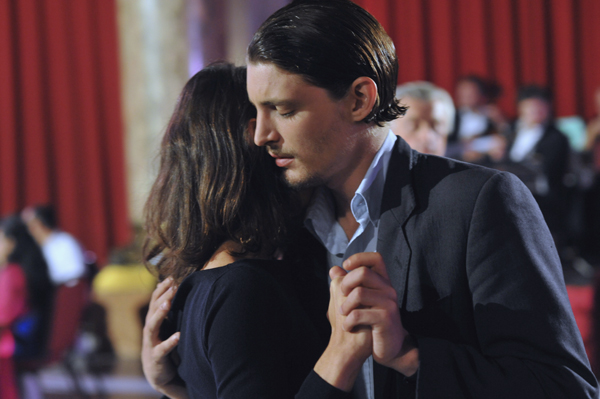Within 11 days’ time, New Yorkers can see a significant slice of current French films that have won acclaim at Cannes and earned praise back home. Rendez-Vous with French Cinema, at the Film Society of Lincoln Center, opened with the star power of Gerard Depardieu and Isabelle Huppert in Happy Valley, and it concludes with the Palme d’Or–winning Dheepan. It’s one of several films here that place the immigrant experience front and center. Among the best films in the program is Emmanuelle Bercot’s Standing Tall, which opened and screened out of competition at last year’s Cannes. It was a consistently stronger film than the other French titles that were in the running for the top prize.
Bercot could be considered the face of this year’s Rendez-Vous. Besides directing, she also stars in actress/director Maïwann’s hothouse ramble My King. In contrast, Bercot’s steely-eyed Standing Tall feels almost vérité, with a volatile performance by teenager Rod Paradot, who won the Most Promising Actor César (more or less the French equivalent of the Oscar) last weekend. My King, on the other hand, is an all-out acting-as-emotional-exhibitionism endeavor. It’s quite a departure from the hushed, emotionally calibrated Carol, which was also competing in Cannes. Bercot tied with Carol costar Rooney Mara for the Best Actress award. (Rumor has it that jury member Xavier Dolan threatened to quit unless Bercot shared the award, in lieu of Mara’s screen partner Cate Blanchett. I hate to gossip, but….)
Just two weeks before the series opened, Philippe Faucon’s Fatima landed Kino Lorber as its U.S. distributor. To the surprise of many journalists, this low-key drama won the recent César Award for Best Film this year, beating out Dheepan, My King, and Standing Tall, among others. Like those three films, Fatima premiered at Cannes. It received respectable reviews but was overshadowed by the attention lavished on others. The empathetic kitchen-sink drama is a lucid and brisk (at 79 minutes) depiction of a single middle-aged Moroccan working as a cleaner, who is routinely confronted with discrimination and condescension. Fatima supports her dutiful medical student daughter (played by Zita Hanrot, who won the Most Promising Actress César) and another daughter, a divergent teenager who skips school and hangs out with the boys.
Like Fatima, Danielle Arbid’s Parisienne offers a straightforward days-of-the-life of an immigrant, though from a different perspective, one less bewildered and more embracing of life in France. Of course, it helps that Lebanese economics student Lina (the sullen and sweet Manal Issa) is a young and unformed 19-year-old from a middle-class, well-educated background.
The movie’s pre-9/11 time frame, 1993 Paris, sets it apart from other movies about immigration, whether in France or in the States. Lina’s religious background is incidental. Presumably she’s Muslim, but identification politics don’t come into play. Instead, the filmmaker focuses on the freshman follies: gaining and losing friends, partying, and dating. Lina’s first long-term relationship is with an older married man—she coyly acknowledges that her life has become like a French novel—and each new guy she dates comes with a different social crowd.
The loosely connected vignettes form a pragmatic portrait of the newcomer’s experience, though the screenplay tacitly acknowledges that Lina’s looks (with curly Julia Roberts hair) are an advantage; she moves in circles that would be hard for someone like Fatima to penetrate, so much so that viewers could play a drinking game: a shot for every time someone says Lina’s beautiful. With this film and others, such as Mia Hansen-Love’s Eden, French filmmakers have cornered the market on works about early adults.
Much Loved is a vivacious and unvarnished look at four Marrakesh prostitutes who form a makeshift surrogate family. It begins with a dinner of couscous and cocaine and zips off to a wild party thrown by rich Arabs, setting a pace that rarely flags—even with hungovers the morning after, the Grey Goose flows freely.
The tracking shots capture the women in their element, whether in a nightclub trying to lure European tourists or on a visit to the old neighborhood. Noha (Loubna Abidar), the mother hen, is nearing 30 and wants to earn enough to open her own hair salon. Meanwhile, she supports her druggy brother and the rest of her family, but her mother can barely embrace her, the breadwinner, yet she accepts Noha’s money without hesitation.
Director Nabil Ayouch unflinchingly follows the women, and his film also makes clear that men, too, are confined by social convention. Similar circumstances have recently been depicted in Salvation Army and Madame Courage (set in Algeria). They have also frankly dealt with issues ranging from prostitution to gay life to drug abuse in North Africa. Of these three films, and perhaps within the entire Rendez-Vous program, Much Love has the strongest, most heartfelt cast.
Speaking of the candid, the lightweight 21 Nights with Pattie contains effusive and very descriptive dialogue that could have been lifted from any issue of Penthouse Forum, courtesy of 40-something single mom Pattie (Karin Viard), who delivers sex-drenched, detailed recitations of many a one-night stand, no matter who’s listening. She makes Sex and the City’s Samantha appear circumspect.
Pattie is one of the country cutups whom mousy 42-year-old Caroline (Isabelle Carré) encounters when she journeys to the Languedoc-Roussillon countryside to the estate of the mother she really didn’t know (mere has just died). The chateau, with breathtaking mountain views and a turquoise swimming pool, seems like the best justification for making this film: it’s all about location, location, location. Besides the scenery, Caroline has a reason to linger in the country with her newfound friends: bizarrely, her mother’s corpse has gone missing.
Essentially, this would-be romp could be called How Caroline Got Her Groove Back as Caroline loosens her marital strings and unbuttons her blouse. Pattie’s multiple monologues of multiple orgasms, the sweaty August nights, and one young man who looks like he has stepped out of a Caravaggio painting all recharge her libido. The pace saunters, like Caroline in her one summer dress, drifting on for about 20 minutes too long.
Another film that might raise eyebrows because of its strong sexual content will open in theaters later this year, Bang Gang (A Modern Love Story), starring a young and often nude cast. The title almost tells all. The film focuses on dozens of middle-class high schoolers who meet up for extracurricular activities: orgies. And this occurs before the Kik app came into use.
The cool and precise Dark Inclusion spins a spare tale of revenge, in the vein of gritty, late 1970s noir. Pier Ulmann’s father has died in a flophouse, while his uncle, the inheritor of the family’s diamond-cutting business, thrives in rough-and-tough Antwerp. Uncle Jo invites Pier to renovate his office and offers his nephew a room in the family posh family manse. As in other films about family intrigue, brooding looks are exchanged in place of dialogue, with resentment running rampant: Dallas meets Thief.
The taciturn nephew learns the tricks of the gem trade behind his uncle’s back and becomes more knowledgeable about gems than his fickle cousin, Gabi, the presumed heir to the family fortune. In fact, Pier proves to be indispensable, coming to Gabi’s aid when he has an epileptic seizure. Pier’s actual father figure, Rachid, an ex-con, has worked out a plan—a heist, actually—to inflict pain on Pier’s relatives. Of course, no matter how carefully the job has been thought out and timed, not all contingencies have been taken into account.
At its best, the script blurs ethnic and familiar loyalties, and in the classic noir tradition, even the core character is sympathetic but not entirely likable. The storytelling is methodical as is the ensemble; the entire cast keeps it cool. The temperature stays low largely because of the self-contained lead performance of Niels Schneider, whose cherubic blond locks are dyed dark brown and slicked back. (He could have been the model for the portrait of Jesus in many a Sunday school class.) This slow burner stays on simmer until the twists and turns of the last 15 minutes.
In 2013, actress/director Valeria Bruni Tedeschi was the sole female filmmaker in the Cannes competition, with what was aptly described as a Chekhovian family drama, A Castle in Italy. In her latest film, made for French TV, she loosens the corsets and lets the hair down of The Three Sisters in the latest attempt to translate the Russian playwright to the screen; the introspective interactions don’t exactly jump off of the screen. In fact, the sisters’ ennui is contagious.
Bruni Tedeschi certainly captures the borderline hysteria bubbling underneath. (If cocaine was available then, the chatty, rambunctious siblings wouldn’t need it.) However, what the ensemble needs is more emotional oppression. Additionally, game-changer sister-in-law Natasha’s role is cut significantly, undercutting the conflict between her and the titular trio. The adaptation, a mixture of time periods, includes on the soundtrack Lou Reed and John Cale’s lament “Small Town,” which sums up the characters’ frustrations as well as anything on screen.
Fortunately, most of this year’s highlights can be seen outside of the Rendez-Vous festival. Standing Tall comes out in April, and in the summer, Sundance Selects will release Alice Winocour’s snazzy genre homage Disorder, with Diane Kruger and Matthias Schoenaerts. For those looking for a discovery, the festival unveils A Decent Man, an electric and harrowing film by Emmanuel Finkiel, with a star turn by Nicolas Duvauchelle. It’s the best of the films that currently don’t have a distributor.









Leave A Comment